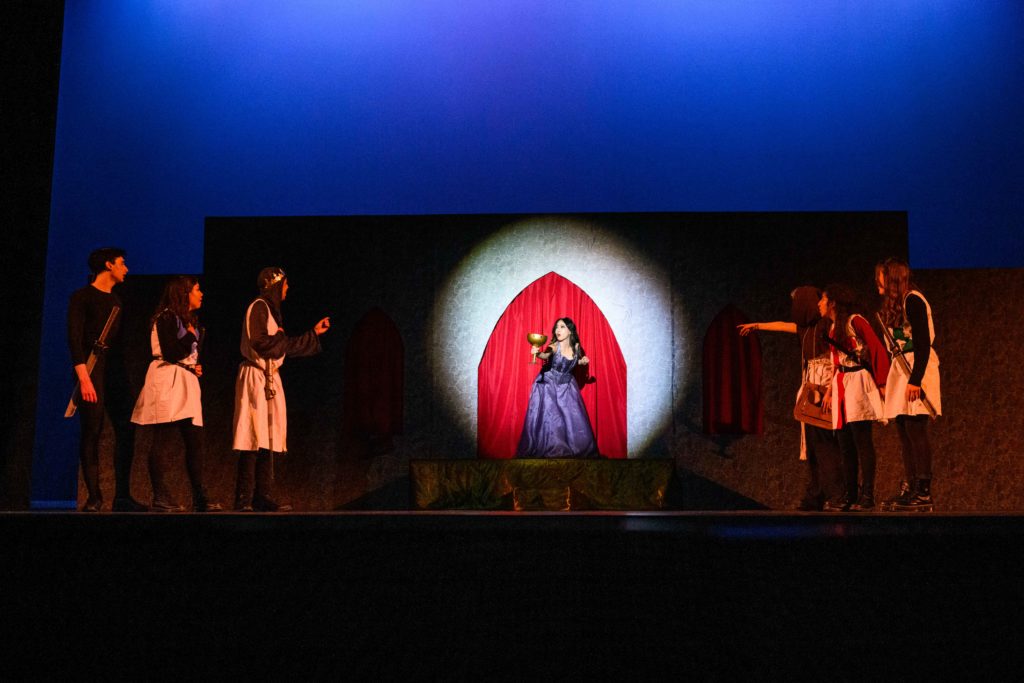‘Spamalot’ aims to find ‘Holy Grail’ with irreverent musical rendition
The cast of Monty Python’s “Spamalot” perform in front of a blue-hued stage. Based on the film “Monty Python and the Holy Grail,” the musical is put on by HOOLIGAN Theatre Company and will begin its run on April 21. (Jenny Xu/Daily Bruin)
“Spamalot”
April 21 - 23
Ralph Freud Playhouse
Prices Vary
By Natalie Agnew
April 21, 2023 10:18 a.m.
Maybe the real Holy Grail in “Spamalot” was the laughs along the way.
HOOLIGAN Theatre Company’s rendition of the satirical musical takes the mainstage at the Freud Playhouse starting Friday. Written by Eric Idle, with music and lyrics by Idle and John Du Prez, the musical adapts the 1975 classic comedy film “Monty Python and the Holy Grail” in a patchwork compilation of episodic sketches. The irreverent parody of medieval Arthurian tales follows King Arthur and his Knights of the Round Table in their quest for the Holy Grail.
“It is two hours of pure chaos and joy,” said Ben Robinow, the production’s director. “It really just has its one goal, which is to entertain in the purest form.”
The fourth-year anthropology student added that outside of entertainment, “Spamalot’s” main message is the quest to find purpose, reflecting HOOLIGAN’s Winter Repertoire theme of “Finding Our Grail.” Carolynn Rui, a second-year psychology student who plays the Lady of the Lake, said although the theme sounds corny, audiences can take away the lesson of living with levity and pursuing their passions.
[Related: UCLA production of ‘Into the Woods’ emphasizes humanity in fairy tales]
While the limitless sketch format gives every character an opportunity to shine, props designer Katsya Kennedy said she was challenged by the substantial number of props used by the production. The third-year anthropology student said because of the limited budget of the student-run theater company, she borrowed some props from Cerritos College and Servite High School while also creating props from scratch. Some of her favorite achievements included crafting cocktail trays full of spray-painted foam Spam cans and elaborate Camelot shields, as well as a quest for an inflatable cow, Kennedy said.
“We ended up finding this really haunted-looking cow on Amazon,” Kennedy said. “She’s kind of become a little bit of a mascot, at least for me, on the show. We call her Bessie.”

“Spamalot” subverts typical musical theater conventions in its emphasis on dialogue over singing with the skit comedy style, Robinow said. Brimming with irreverence, Monty Python revolutionized the typical joke setup and punchline format, instead pushing for more with no concrete end, he added.
Robinow said the show parodies and alludes to countless staples of the musical genre, from songs to character archetypes, which is encapsulated by “The Song That Goes Like This.” Spotlighting campy vocal acrobatics, Robinow said the melodramatic rock ballad mimics “The Phantom of the Opera,” featuring a sequence of increasingly high-pitched vocals. Lyrics in “The Song That Goes Like This” play up the show’s self-mocking nature with characters voicing their grievances about its excessive key changes and endless length, he said.
[Related: All-Black play ‘SuperAmerica’ spotlights effects of capitalism on Black experience]
To capture references in characterization, Rui said Robinow directed her to study video footage of famous Broadway divas such as Patti LuPone, Liza Minnelli and Bernadette Peters, as well as to write hypothetical theater biographies to immerse herself in her character. Rui said the most challenging part of the role was commanding a wide range of vocal styles such as jazz, which she had never sung before.
As the musical’s only central female character, the Lady of the Lake is introduced by bestowing Arthur with knighthood and relishes in the spotlight, Rui said. The culmination of her character arc is “Diva’s Lament (What Ever Happened To My Part?).” Rui added that part of the fun in playing this larger-than-life character is that no acting or singing choice is too small.
“She’s (the Lady of the Lake) the only character in the show that knows it’s a show and doesn’t take it as seriously as everyone else,” Rui said. “That definitely defines a lot of her character. She’s just in it to be on stage and to be performing and to have all the attention on her, so I would definitely just say she’s a diva.”
With the prominence of nostalgia in the production, Robinow said the evolving nature of comedy presents an obstacle. In essence, the comedy is inspired by a 1975 movie adapted into a play in the 2000s, so the production faced the challenge of translating it to 2023, he said. The key was obtaining total commitment from the cast and finding comedy in themselves, which Robinow said translates to audience enjoyment.
Kennedy said she hopes, above all, the audience members allow themselves to laugh and to take part in the silly setting that is “Spamalot” while enjoying its specific brand of theatrical comedy. Amid theaters struggling more than ever before the pandemic, Robinow said he wants the show to remind people why theater matters.
“Theater is just really struggling as an industry, which makes me very sad, but it makes a lot of sense,” Robinow said. “I’m hopeful that ‘Spamalot’ will help people see, ‘Oh, this is why theater exists. This is why we do this. This is why such an inconvenient art form, in many ways in that how much work it constantly requires, persists and why it’s important.’”
